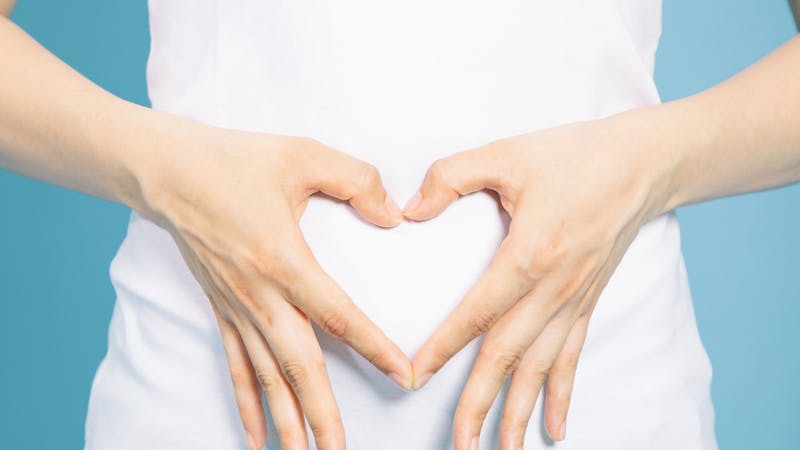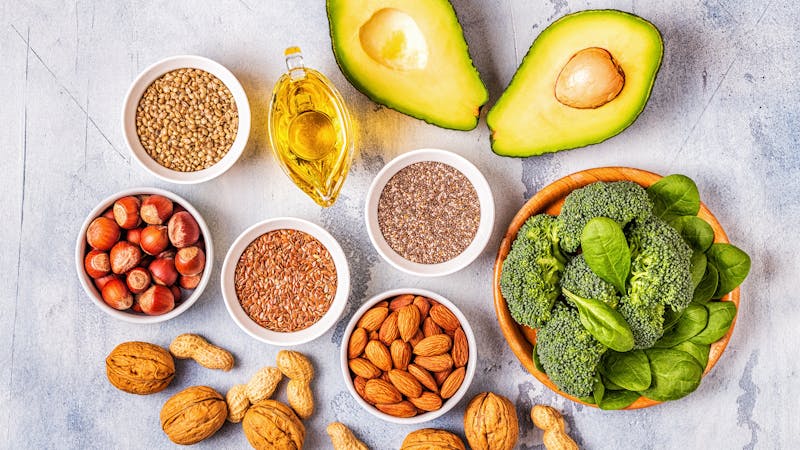What to do about constipation on a low-carb or keto diet
Have you become more constipated since starting a low-carb or keto diet? Or are you hesitant to try a low-carb diet after learning constipation may be a side effect?
If so, this guide will help explain all things related to low carb and constipation.

What is constipation?
Before exploring how low-carb eating and constipation are related, we first need to define what constipation is.
Constipation is an uncomfortable decrease in bowel movements that interferes with daily life. The medical literature defines constipation as three or fewer bowel movements per week. However, more important than the numerical definition is determining if going to the bathroom less often is a problem or not.
Therefore, we need to differentiate a normal decrease in stool frequency from pathological constipation.
Signs of pathological constipation include bloating, abdominal pain, excessive gas, bloody stools, and straining or discomfort with bowel movements. The complete absence of these symptoms likely signifies a natural reduction in stool frequency, not constipation.
Here is possibly the most important take-home point of this entire guide: If your bowel movements decrease, but you have no other symptoms or changes, you are not suffering from constipation.
How prevalent is constipation on a keto diet?
The prevalence of constipation on a low-carb or keto diet can be as high as 50% according to some studies.1 Clinicians familiar with low-carb diets, however, feel it is closer to 25%.2 The good news is that clinicians also agree that constipation is usually mild and self-resolves over time, or it is easily treated with home and over-the-counter remedies.
Why does constipation happen on a keto diet?
While there is no one science-backed reason, there are several theories as to why someone on a keto diet may suffer from constipation.
The first is an acute decrease in fiber. While it is debatable if you need fiber for healthy bowel movements, many believe that your body needs time to adjust to a sudden decrease in fiber content. Therefore, if someone was getting a lot of fiber from whole grains, fruit, and beans — and suddenly stopped eating those foods — that may temporarily result in constipation.3 Of course, some people may actually increase their fiber intake on a low-carb diet if they replace processed sugars and starches with vegetables.
Keep in mind that low-carb diets don’t have to be low in fiber. Above-ground veggies and seeds can still provide plenty of fiber for most people. Read more in our guide about the best low-carb high-fiber foods.
Another potential cause for constipation is dehydration. It is well known that the transition to a very low-carb diet can cause an increase in urination with fluid and sodium loss.4 This can result in mild dehydration, which is potentially associated with constipation.
Along these same lines, some believe a change in body electrolytes can alter stool frequency.
Last, low-carb diets often result in a natural caloric decrease.5
This reduction in calories is especially common if low carb is combined with intermittent fasting. Eating less can mean eliminating less. This alone should not cause constipation, but could decrease stool volume or frequency.
How to prevent or treat constipation on a keto diet
Here are our top six tips for how to manage constipation on a low-carb or keto diet:
- Keep hydrated: Since dehydration is a potential reason for constipation, it makes sense that adequate hydration can help prevent or treat constipation. This has not been tested in a well-controlled clinical trials, and certainly not with a low-carb diet.6
However, many experts believe that avoiding dehydration is an essential step for preventing constipation. How do you know if you are well hydrated? If you are urinating at least four times per day and your urine is clear, not yellow, then you are likely well hydrated. Also remember, not all fluids are the same. Greater amounts of caffeinated fluids, like coffee and tea, may lead to sodium loss and dehydration.7
- Get adequate salt: Just like with hydration, this hasn’t been studied in clinical trials, but the idea is that increasing salt intake can help with fluid retention and preventing dehydration. What is “adequate salt?” This may vary for each individual, but a good starting point is between four and six grams of sodium per day (that’s about 2.5 teaspoons per day). To learn more you can read our evidence-based guide on salt.
- Eat more fiber: Maintaining adequate fiber intake may be the most effective approach for preventing low-carb induced constipation.8 We recommend getting fiber from whole foods whenever possible. Above-ground veggies, nuts, and seeds all are good sources of low-carb fiber. Learn more in our visual guide to low-carb veggies.
How much fiber is enough? The Academy of Nutrition and Dietetics recommends 25 grams per day for women and 38 grams for men from food sources.9 However, these are best estimates for a population, and may not apply to those on a low-carb diet or those suffering from constipation. You can use this as a starting point and adjust as needed.
To get 25 grams of fiber, you can combine one avocado, one cup of broccoli, and ten spears of asparagus. For 38 grams, you can add an additional one-half cup of macadamia nuts and two tablespoons of chia seeds. You can find more fiber-filled foods in our guide on low-carb, high-fiber foods.
If you still feel you need more fiber, supplementing with insoluble fiber like psyllium husk can also help.10 The starting dose of psyllium husk is usually 5 grams per day, increasing to 10 grams if needed. - Take magnesium supplements: Magnesium is a well-known laxative, and is also a frequently recommended supplement.11 At doses of around 200 to 400 mg, magnesium is usually well tolerated. However, higher doses may lead to loose stools or overt diarrhea. For someone suffering from constipation, this may be a welcomed effect. Consider starting with 600mg and increasing to 1,000 mg daily if needed (do not exceed 2,000 mg).
- Add MCT oil: Another solution is adding medium-chain triglyceride (MCT) oil. MCT oil can help promote ketosis and can also stimulate gut motility and bowel movements. Consider starting with one to two tablespoons (0.5 to 1 ounce) and slowly increase if needed.12
Just be aware that one tablespoon has 115 calories. These calories can add up quickly if you take multiple tablespoons per day. - Be physically active: Some research suggests that regular physical activity may improve constipation.13 Given the many other benefits of physical activity, it is an easy one to recommend!
If constipation does not improve with any of the interventions mentioned above, over-the-counter stool softeners such as Colace, or laxatives, such as Dulcolax, could be an option. Make sure to follow package directions and warnings.
Someone experiencing constipation would rarely need medical evaluation, but that is an important option if the other interventions don’t succeed.
Constipation take-home message
Most people will tolerate low-carb or keto eating without significant constipation.
However, some may suffer from constipation beyond a simple decrease in stool frequency. The good news is that most will experience constipation as a short-lived annoyance.
For those who continue to suffer from infrequent bowel movements, there are several potential interventions, as we described in this guide. These interventions are all compatible with a low-carb lifestyle to help you maintain the benefits of low carb while getting back on track with your normal bowel habits.
/ Dr. Bret Scher, MD
Start your FREE 7-day trial!
Get instant access to healthy low-carb and keto meal plans, fast and easy recipes, weight loss advice from medical experts, and so much more. A healthier life starts now with your free trial!
Start FREE trial!
What to do about constipation on a low-carb or keto diet - the evidence
This guide is written by Dr. Bret Scher, MD and was last updated on June 19, 2025. It was medically reviewed by Dr. William Yancy, MD on December 8, 2020.
The guide contains scientific references. You can find these in the notes throughout the text, and click the links to read the peer-reviewed scientific papers. When appropriate we include a grading of the strength of the evidence, with a link to our policy on this. Our evidence-based guides are updated at least once per year to reflect and reference the latest science on the topic.
All our evidence-based health guides are written or reviewed by medical doctors who are experts on the topic. To stay unbiased we show no ads, sell no physical products, and take no money from the industry. We're fully funded by the people, via an optional membership. Most information at Diet Doctor is free forever.
Read more about our policies and work with evidence-based guides, nutritional controversies, our editorial team, and our medical review board.
Should you find any inaccuracy in this guide, please email andreas@dietdoctor.com.
In a study of people with type 2 diabetes, who ate 20 or fewer grams of carbs per day, slightly more than half complained of constipation at some point during the trial:
Nutrition & Metabolism 2008: The effect of a low-carbohydrate, ketogenic diet versus a low-glycemic index diet on glycemic control in type 2 diabetes mellitus [randomized trial; moderate evidence]
↩This is based on consistent clinical experience of low-carb practitioners. [weak evidence] ↩
Most of the data on fiber and bowel frequency comes from lower-quality observational studies, such as the following.
Public Health and Nutrition 2004:
Nutrition and lifestyle in relation to bowel movement frequency: a cross-sectional study of 20630 men and women in EPIC-Oxford [observational study, weak evidence]But there are higher-quality studies, such as the following meta-analysis of RCTs, which showed a small improvement in stool frequency with increasing fiber. Granted, that is not the same as proving that removing fiber causes constipation. However, this evidence combined with clinical experience has led many to believe the removal of fiber causes constipation.
World Journal of Gastroenterology 2012: Effect of dietary fiber on constipation: a meta analysis [systematic review of randomized trials; strong evidence]
Interestingly, not all studies agree, and there may be a threshold effect where too much fiber can worsen constipation. the following nonrandomized trial showed improvement of constipation after subjects decreased fiber intake
World Journal of Gastroenterology 2012: Stopping or reducing dietary fiber intake reduces constipation and its associated symptoms [nonrandomized study, weak evidence]
The conflicting data may relate the individual variations in the baseline diet, although this has not been adequately studied.
↩It’s known that when insulin levels drop — as they do when carb intake is very low— the kidneys excrete more sodium and water, although the exact mechanism isn’t clear:
American Journal of Physiology. Renal Physiology 2007: Insulin’s impact on renal sodium transport and blood pressure in health, obesity, and diabetes [overview article; ungraded]
Diabetalogia 1981: The effect of insulin on renal sodium metabolism [overview article; ungraded] ↩
Several studies have reported that calorie intake spontaneously decreases when very few carbs are consumed:
Nutrition and Metabolism 2008:: The effect of a low-carbohydrate, ketogenic diet versus a low-glycemic index diet on glycemic control in type 2 diabetes mellitus [randomized controlled trial; moderate evidence]
The American Journal of Clinical Nutrition 2008: Effects of a high-protein ketogenic diet on hunger, appetite, and weight loss in obese men feeding ad libitum [randomized controlled trial; moderate evidence]
The Journal of Medical Internet Research 2017: An online intervention comparing a very low-carbohydrate ketogenic diet and lifestyle recommendations versus a plate method diet in overweight individuals with type 2 diabetes: a randomized controlled trial [moderate evidence]
In one small study, 10 obese adults with type 2 diabetes who followed a non-calorie-restricted, very-low-carb diet ended up eating about 1,000 calories less, on average — even though they were permitted unrestricted intake of fat and protein foods:
Annals of Internal Medicine 2005: Effect of a low-carbohydrate diet on appetite, blood glucose levels, and insulin resistance in obese patients with type 2 diabetes [non-controlled study; weak evidence] ↩
Journal of Pediatrics 2017: Water and fluid intake in the prevention and treatment of functional constipation in children and adolescents: is there evidence? [review of observational and interventional studies, weak evidence] ↩
In the following study, lower doses of caffeine, 3mg/kg, did not cause dehydration, whereas higher doses, 6mg/kg, did cause dehydration.
Frontiers in Nutrition 2017: Coffee with high but bot low caffeine content augments fluid and electrolyte excretion at rest [nonrandomized study, weak evidence] ↩
[anecdotal reports; very weak evidence]
It is important to note that not all fibers act the same way in gastrointestinal motility. As the following review summarizes, fermentable fibers generally do not stimulate bowel movements as do large particle insoluble fibers and gel-forming soluble fibers.
Journal of the Academy of Nutrition and Dietetics 2017: Understanding the Physics of Functional Fibers in the Gastrointestinal Tract: An Evidence-Based Approach to Resolving Enduring Misconceptions about Insoluble and Soluble Fiber [overview article; ungraded]
↩Journal of the The Academy of Nutrition and Dietetics 2015: Position of the Academy of Nutrition and Dietetics: Health implications of dietary fiber [overview article; ungraded] ↩
Clinical Nutrition ESPEN 2019: Effect of flaxseed or psyllium vs. placebo on management of constipation, weight, glycemia, and lipids: a randomized trial in constipated patients with type 2 diabetes [moderate evidence]
↩Clinics in Colon and Rectal Surgery 2010: Medical management of constipation [overview article; ungraded]
↩This is based on consistent clinical experience of low-carb practitioners. [weak evidence] ↩
Diabetes Metabolic Syndrome and Obesity 2017: Effects of a proposed physical activity and diet control to manage constipation in middle-aged obese women [randomized trial; moderate evidence] ↩












